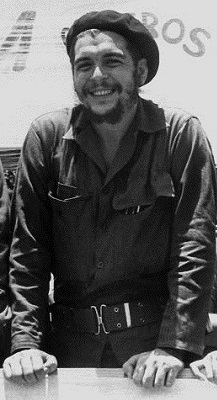|
~ Ernesto Che Guevara
~ Galéria
~ Oldal
~ Bejelentkezés
~ Vissza a Főoldalra
Ernesto Che Guevara, az argentin származású forradalmár, miniszter, gerillavezér és író, Buenos Aires-ben szerzett orvosi diplomát, majd a kubai forradalom során jelentős szerepet játszott a szigetország felszabadításában és újjáépítésében. A kubai gazdaság talpraállításáért dolgozott, küzdött az oktatás és az egészségügy fejlesztéséért, az írástudatlanság és a faji előítéletek felszámolásáért. Saját példájával népszerűsítette az önkéntes munkát. Kongóban és Bolíviában is harcolt - harminckilenc éves volt, amikor az amerikai-bolíviai csapatok csapdába ejtették és kivégezték.
| | |
|

| | |
|
|
|
Charge and refutation: Che Guevara enjoyed big feasts and luxury.
|
Vád: Che Guevara nagy lakomákat csapott és luxuskörülmények között élt.
A cikkem egyenlőre csak angolul olvasható - lásd a linket lentebb - azonban készül a magyar fordítása is.
|
Charge and refutation: Che Guevara enjoyed big feasts and luxury.
Anyone can clearly see that after the victory of the Cuban Revolution, the fairly slim Che Guevara became a much stronger-built man and he obviously put on some weight.
[Some photos included from 1959 to 1965]
Some people accuse him of living a luxurious life with huge, rich meals and luxury objects like his famous Rolex watch or his home in the popular and rich neighbourhood, Tarará.
Che was really given expensive presents by foreign ambassadors every time he met representatives of foreign countries in Havana or abroad, and he gave these presents to other people, schools or other insitiutes - with the exception of the watches that were important for a guerrilla fighter.
[Read the whole article]
|
|
|
| | |
|
|
|
~ Ernesto Che Guevara
~ Gallery
~ Site
~ Log in
~ Back to the Main page
Ernesto Che Guevara, the Argentine-born revolutionary, minister, guerrilla leader and writer, received his medical degree in Buenos Aires, then played an essential part in the Cuban Revolution in liberating and rebuilding the country. He did his best to set up the Cuban economy, fought for the improvement of the education and the health system, the elimination of illiteracy and racial prejudice. He promoted voluntary work by his own example. He fought in the Congo and in Bolivia - he was thirty-nine years old, when he was trapped and executed by the joint American-Bolivian forces.
| | |
|
|

